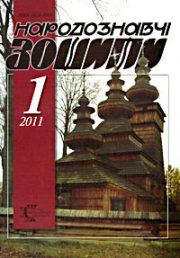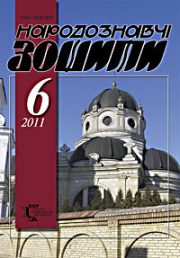The Ethnology Notebooks. 2023. № 5 (173), 1202—1215
UDK [930.2:327.8](470+571:477)
DOI https://doi.org/10.15407/nz2023.05.1202
HISTORICAL SOURCES OF THE «RUSSIAN WORLD» DOCTRINE IN THE UKRAINIAN QUESTION: EURASIANISM
POLESHCHUK Tamara
- ORCID ID: https://orcid.org/0000-0002-3136-9340
- Candidate of History, Docent,
- The Ivan Franko National University of Lviv,
- Department of History of Central and Eastern Europe,
- 1, Universytetska str., 79000, Lviv, Ukraine,
- Contacts: е-mail: tpol@ukr.net
Abstract. Introduction. The concept of the «Russian world» has no unambiguous interpretation or legal definition. Over the past decade, the concept of the «Russian world» has been an integral part of Putin’s Russia’s state policy.
Statement of the problem. Russia’s full-scale war against Ukraine, unleashed on 24 February 2022, and the war crimes committed by the Russian occupiers on Ukrainian lands, force us to take a deeper look at the nature of the «Russian world», rethink its ideological roots, and the role of the Ukrainian question in this concept. One of the sources of the «Russian world» was the ideas of Russian Eurasians of the 1920s and 1930s and their contemporary followers.
The purpose of the article is to show the role and importance of the Ukrainian question in the ideology of Eurasianism and neo-Eurasianism, and the impact of these views on the concept of the «Russian world».
The methodological basis is the principles of historicism, determinism and systematicity, which, when applied to historical and typological and comparative historical methods, allow us to analyse the influence of the Eurasian ideology, in particular, their vision of the Ukrainian question, on the doctrine of the «Russian world».
Results. In search of a way out of the crisis of national and cultural identity caused by the collapse of the USSR, intellectuals close to the authorities formed the doctrine of the «Russian world». One of its nourishing sources was the legacy of the Eurasians of the 1920s and 1930s. Back then, in response to the collapse of the Russian Empire and the Bolsheviks’ rise to power, a group of young scholars, emigrants from Russia, created the doctrine of Russia-Eurasia as an original civilisation, whose creator and driver of development was to be a «triune nation» of Russians, Ukrainians and Belarusians. Eurasian leaders M. Trubetskoy, P. Savitsky sought to convince Ukrainians that their intentions to develop their own national culture and fight for an independent state were fatal. Leading representatives of the Ukrainian emigration D. Doroshenko and O. Mytsiuk, in a public debate argued against the approaches and assessments of M. Trubetskoy and his associates regarding the emergence and prospects of the Ukrainian language and culture, and the ability of the Ukrainian people to create their own statehood.
Conclusions. The concept of the «Russian world» has incorporated an eclectic mix of historical myths, various intellectual and political constructs. The legacy of the Russian Eurasians and their contemporary followers as part of the «Russian World» doctrine has become the core of Putin’s policy and neo-imperial practice, and the justification for a full-scale war against Ukraine.
Keywords: Eurasianism, neo-Eurasianism, Russian-Ukrainian war, Russia, «Russian world», Ukraine, Ukrainian question.
Received 15.09.2023
REFERENCES
- Plokhij, S. (2019). The Lost Kingdom. The History of the Russian World from 1470 to the Present. Translated from English. Kharkiv: Folio [in Ukrainian].
- Yakubova, L. (2018). «Russian World» in Ukraine: on the edge of the abyss. Kyiv: Klio [in Ukrainian].
- Yakubova, L. (2020). Eurasian rift. Ukraine in the Age of Hybrid Challenges. Second edition, revised. Kyiv: Klio [in Ukrainian].
- Snyder, T. We should say it. Russia is the Fascist. The New York Times. 19.05.2022. Retrieved from: https://www.nytimes.com/2022/05/19/opinion/russia-fascism-ukraine-putin.html (Last accessed: 9.08.2023).
- Yakubova, L. (2022). The Ontology of Rashism: Ukraine as an alter ego of Russia. Ukrains’kyj istorychnyj zhurnal, 4, 78—92 [in Ukrainian].
- Denysenko, V. (2023). How to destroy the Russian world. Kyiv: Nash Format [in Ukrainian].
- Epshteyn, M. (2023). Russian Anti-World. Politics on the brink of apocalypse. New York: Franc-Tireur USA [in Russian].
- Trubetskoy, N. (1920). Europe and Humankind. Sofiya: Ros.-bolg. kn-vo [in Russian].
- Savitskiy, P. (1921). Europe and Eurasia: (on the brochure of prince N.S. Trubetskoy «Europe and Humankind». Russkaya myisl, 1—2, 119—138 [in Russian].
- Savitsky, P., & Suvchinsky, P. (Eds.). (1921). Exodus to the East: Premonitions and Fulfilments: The Assertions of the Eurasians (Book 1). Sofiya: Ros.-bolg. kn-vo [in Russian].
- Laryujel, M. (2004). Ideology of Russian Eurasianism, or Thoughts on the Greatness of Empire. Moscow: Natalis [in Russian].
- Antropov, O. (2008). Russian emigration in search of political unification (1921—1939). Astrahan: Astrahanskiy un-t [in Russian].
- Lyuks, L. (2009). Eurasian ideology in the European context. Forum noveyshey vostochnoevropeyskoy istorii i kulturyi. Russkoe izdanie, 1, 39—56. Retrieved from: https://www1.ku.de/ZIMOS/forum/inhaltruss11.html (Last accessed: 10.08.2023) [in Russian].
- Bayssvenger, M. (2009). «Conservative revolution» in Germany and the Eurasianist movement: points of contact. Forum noveyshey vostochnoevropeyskoy istorii i kulturyi. Russkoe izdanie, 2, 23—40. Retrieved from: https://www1.ku.de/ZIMOS/forum/inhaltruss12.html (Last accessed: 10.08.2023) [in Russian].
- Bassin, M., Glebov, S. & Laruelle, M. (Eds). (2015). Between Europe and Asia: The Origins, Theories and Legacies of Russian Eurasianism. Pittsburgh, PA: University of Pittsburgh Press.
- Shnirelman, V. (2002). Russians, non-Russians and Eurasian federalism: Eurasians and their opponents in the 1920s. Slavyanovedenie, 4, 3—20 [in Russian].
- Andriievs’kyj, D. (1926). Eurasianism. Tryzub, 40, 7—12 [in Ukrainian].
- Mytsiuk, O. (1930). Eurasianism. Praha: Nakladom avtora, dzherelo Kramerius [in Ukrainian].
- Poleshchuk, T. (2019). Ukrainian or «all-Russian» culture: from the history of Ukrainian-Russian intellectual discussions of the last decades of the nineteenth and early twentieth centuries. Visnyk of Lviv University. Series historic. Special issue: Academic essays in honor of professor Roman Shust (Pp. 741—758) [in Ukrainian].
- Savitsky, P.N. (1915). Struggle for Empire. Imperialism in politics and economy. Russkaya myisl, 12, 68—71 [in Russian].
- Savickij, P.N. (1926). Velikorossiya and Ukraine in Russian culture. Rodnoe slovo, 8, 10—14 [in Russian].
- Savickij, P.N. (1931). In the Struggle for Eurasianism. Polemics around Eurasianism in the 1920s. Parizh: Evraz. knigoiz-vo [in Russian].
- Khvyl’ovyj, M., & Kostiuk, H. (Ed.). (1983). The Vision of the Asian renaissance and Ukraine. Works: in five volumes (Vol. 4, pp. 419—422). N’iu-Jork; Baltimor; Toronto: Ob’iednannia ukrains’kykh pys’mennykiv «Slovo»; Ukrains’ke vydavnytstvo «Smoloskyp» imeni V. Symonenka [in Ukrainian].
- Dziuba, I. (2005, 14.10). Mykola Khvylovyi: «Asian Renaissance» and «Psychological Europe». Dzerkalo tyzhnia [in Ukrainian].
- Trubeckoj, N. (1927). Toward the «Ukrainian problem». Evrazijskij vremennik, 5, 165—184 [in Russian].
- Doroshenko, D. (1928). Toward the «Ukrainian problem». Concerning the article by pr. N.S. Trubetskoj. Evrazijskaya hronika, 10, 41—51 [in Russian].
- Trubetskoj, N. (1928). Reply to D.I. Doroshenko. Evrazijskaya hronika, 10, 51—59 [in Russian].
- Dvornichenko, A. (2015). G.V. Vernadsky about Ukraine and the Ukrainian question (Toward the publication of G.V. Vernadsky‘s article «Prince Trubetskoj and the Ukrainian question». Yestnik of St. Petersburg University (Ser. 2, issue 2, pp. 71—77) [in Russian].
- Viderker, Sh. (2012). Perception of L.N. Gumilev’s works in the late Soviet and post-Soviet periods: Russian intelligentsia in search of reference points. Forum noveyshey vostochnoevropeyskoy istorii i kulturyi. Russkoe izdanie, 1, 7—20. Retrieved from: https://www1.ku.de/ZIMOS/forum/inhaltruss17.html (Last accessed: 10.08.2023) [in Russian].
- Panarin, A.С. (1992). Civilisation Process in Russia: Experience of Defeat and Lessons for Tomorrow. Znamya, 7, 195—210 [in Russian].
- 31.Panarin, A.S. (1995). Eurasian project in the world-system context, Vostok, 2, 66—79 [in Russian].
- Laryujel, M. (2009). Alexander Panarin and «civilizational nationalism» in Russia. Forum noveyshey vostochnoevropeyskoy istorii i kulturyi. Russkoe izdanie, 2, 143—158. Retrieved from: https://www1.ku.de/ZIMOS/forum/inhaltruss12.html (Last accessed: 10.08.2023) [in Russian].
- Umland, A. (2009). Formation of the right-radical «Neo-Eurasian» intellectual movement in Russia (1989—2001). Forum noveyshey vostochnoevropeyskoy istorii i kulturyi. Russkoe izdanie, 1, 93—104. Retrieved from: https://www1.ku.de/ZIMOS/forum/inhaltruss11.html (Last accessed: 10.08.2023).
- Viderker, Sh. (2010). «Continent Eurasia»: classical Eurasianism and geopolitics as presented by Alexander Dugin. Forum noveyshey vostochnoevropeyskoy istorii i kulturyi. Russkoe izdanie, 1, 5—14. Retrieved from: https://www1.ku.de/ZIMOS/forum/inhaltruss13.html (Last accessed: 10.08.2023) [in Russian].
- Shehovcev, A., & Umland, A. (2010). Philosophia Perennis and «Neo-Eurasianism»: the role of integral traditionalism in the utopian constructions of Alexander Dugin. Forum noveyshey vostochnoevropeyskoy istorii i kulturyi. Russkoe izdanie, 2, 169—186. Retrieved from: https://www1.ku.de/ZIMOS/forum/inhaltruss14.html (Last accessed: 10.08.2023) [in Russian].
- Ingrem, A. (2011). Alexander Dugin’s Geopolitics and Neofascism in the Context of Post-Soviet Russia. Forum noveyshey vostochnoevropeyskoy istorii i kulturyi. Russkoe izdanie, 2, 7—33. Retrieved from: https://www1.ku.de/ZIMOS/forum/inhaltruss16.html (Last accessed: 10.08.2023) [in Russian].
- Dugin, A. (1997). Foundations of Geopolitics: The Geopolitical Future of Russia. Moscow: Artogeya [in Russian].
- Pahlevska, O. (2011). Neo-Eurasism, the crisis of Russian identity in Ukraine. Part two. Forum noveyshey vostochnoevropeyskoy istorii i kulturyi. Russkoe izdanie, 2, 127—156. Retrieved from: https://www1.ku.de/ZIMOS/forum/inhaltruss16.html (Last accessed: 10.08.2023) [in Russian].
- Shchedrovickij, P. (2000, 11.02). Russian world. Nezavisimaya gazeta. Retrieved from: http://www.ng.ru/ideas/2000-02-11/8_russian_world.html (Last accessed: 9.08. 2023) [in Russian].
- Yablons’kyj, V.M., & Zdioruk, S.I. (Ed.). (2014). Ukraine and the project of the Russian world: Analytical supplement. Kyiv: NISD [in Ukrainian].
- (2007, 10.02). Vladimir Putin’s speech at the Munich political and security conference. Retrieved from: http://www.kremlin.ru/events/president/transcripts/24034 (Last accessed: 10.08.2023) [in Russian].
- (2008, 7.04). Putin to Bush: «Ukraine is not a state». Retrieved from: https://www.pravda.com.ua/news/2008/ 04/7/3410762/ (Last accessed: 10.08.2023) [in Ukrainian].
- Babyns’kyi, A. (2023). War for the «Russian world» or «Holy Rus?» Ideological roots of Russian aggression. Naukovi zapysky UKU: Bohoslovia, 10, 225—251. DOI: 10.47632/2075-4817-2023-10-225-251 [in Ukrainian].
- July 27, 2013: The day Putin declared war on Ukraine. Retrieved from: https://www.depo.ua/ukr/life/27-lipnya-2013-roku-den-koli-putin-ogolosiv-ukrayini-viynu-20170727613074 (Last accessed: 10.08.2023) [in Ukrainian].
- Russia will help Russians in Ukraine — Putin’s press secretary. Retrieved from: https://news.liga.net/politics/news/rossiya_pomozhet_russkim_v_ukraine_press_sekretar_putina (Last accessed: 10.08.2023) [in Russian].
- (2014. 18.03). Address of the President of the Russian Federation. Retrieved from: http://www.kremlin.ru/events/president/news/20603 (Last accessed: 10.08.2023) [in Russian].
- Atanesian, H. (2022, 27.08). Fascism and Eurasianism. How Alexander Dugin, who hates and fears Ukraine, is connected to the Kremlin. Retrieved from: https://www.bbc.com/ukrainian/features-62699184 (Last accessed: 10.08.2023) [in Ukrainian].
- Averyanov, V. (Ed.). (2016). The Doctrine of Russian world. In Doctrine of the Russian world. Publisher’s text. Moscow: Knizhny mir. Retrieved from: http://www.litres.ru/pades/biblio_book/?art=23318523&lfrom=92259001 (Last accessed: 10.08.2023) [in Russian].
- «A mix of ignorance and aggression»: Russian and Ukrainian historians on Putin’s article. Retrieved from: https://www.bbc.com/ukrainian/features-57825840 (Last accessed: 10.08.2023) [in Ukrainian].
- Barbashin, A., & Thoburn, H. (2014). «Putin’s brain». Alexander Dugin and the philosophy behind Putin’s invasion of Crimea. Foreign Affairs. Retrieved from: https://www.foreignaffairs.com/articles/russia-fsu/2014-03-31/putins-brain (Last accessed: 10.08.2023).
- Drehle, Von L. (2023, 22.03). The man known as «Putin’s brain» envisions the splitting of Europe — and the fall of China. The Washington Post. Retrieved from: https://www.washingtonpost.com/opinions/2022/03/22/alexander-dugin-author-putin-deady-playbook/ (Last accessed: 10.08.2023).
- Is Alexander Dugin a prophet or a Russian fascist? An event about the murder of the daughter of Putin’s brain. Retrieved from: https://www.bbc.com/ukrainian/features-62639823 (Last accessed: 9.08.2023) [in Ukrainian].
- Attack on Putin’s Rasputin. What does the murder of Alexander Dugin’s daughter mean for Russia and what forces may be behind it — World Media. Retrieved from: https://nv.ua/ukr/world/countries/hto-vbiv-donku-dugina-i-shcho-ce-oznachaye-oglyad-zahidnih-zmi-50264789.html (Last accessed: 9.08.2023) [in Ukrainian].
- Dugin, A. (2023, 21.02). SWO: Year one. Paradigm shift. Retrieved from: https://www.geopolitika.ru/article/svo-god-pervyy-smena-paradigmy (Last accessed: 9.08.2023).
- Four Russian writers and political scientists have been added to the Ministry of culture’s «black list». Retrieved from: https://www.pravda.com.ua/news/2018/09/24/7192983/ (Last accessed: 10.08.2023) [in Ukrainian].
- (2022). Official Journal of the European Union (Vol. 65). Retrieved from: https://eur-lex.europa.eu/legal content/EN/TXT/PDF/?uri=OJ:L:2022:259I:FULL&from=EN (Last accessed: 10.08. 2023).
- Decree of the President of Ukraine № 4/2023 «On the decision of the National security and defense council of Ukraine of January 6, 2023» «On the application and amendments to personal special economic and other restrictive measures (sanctions)». Retrieved from: https://www.president.gov.ua/documents/42023-45517 (Last accessed: 10.08.2023) [in Ukrainian].
- The SBU served a notice of suspicion to racist ideologue Oleksandr Dugin. Retrieved from: https://ssu.gov.ua/novyny/sbu-povidomyla-pro-pidozru-ideolohu-rashyzmu-oleksandru-duhinu (Last accessed: 10.08.2023) [in Ukrainian].





